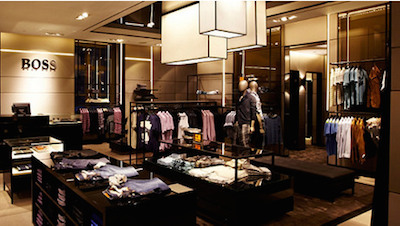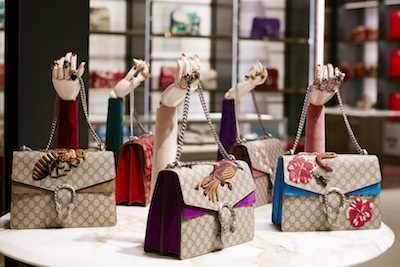 Photo of VivaLuxury courtesy of Bergdorf Goodman
Photo of VivaLuxury courtesy of Bergdorf Goodman
Bricks-and-mortar retail is still generally operating in an out-of-date fashion, creating obstacles for sales staff, according to the Luxury Institute. The consultancy conducted a focus group with 40 store managers who oversee multi-brand, premium and luxury stores, and found that there are a number of improvements that companies could make to help their in-store staff be more productive and effective. From updating technology and CRM systems to reallocating employee resources, there is room for improvement that needs to begin at the top.
"Currently, stores are designed to be points of sale rather than relationship building centers," said Milton Pedraza, founder and CEO of Luxury Institute. "Stores need to be redesigned aesthetically and digitally to be spaces that make clients feel special and inspires them to buy."
In-store solutions Store managers frequently find themselves off the sales floor as they work to fulfill organizational tasks in the back of the house, such as sorting inventory, generating reports and communicating with the corporate office. This time they spend in their offices takes away from time they could be spending creating a relationship with customers.
In addition, sales associates may run into the back to open boxes, leaving them frazzled and potentially dirty when they return to meet clients on the sales floor. Apple, for one, has changed this division of responsibilities, separating the functions of operations and consumer engagement into different positions. In place of the store staff, a specialized team could take care of back of house operations for a small region. Hugo Boss store on Fifth Avenue
This frees up sales staff to focus on client retention, data collection and conversion, which will add up to sales in the long term. In this environment, Luxury Institute found store managers would feel more comfortable having higher sales goals set.
More than half of managers said they have absolutely no control over hiring and firing their employees, and none have complete control, creating an environment where up to 40 percent of workers are underperforming.
While they do not have the ability to build their teams to their specifications, store managers are still held accountable for the results generated by their employees. These managers would like corporate to enact educational outreach to train managers and associates in employee selection, helping them to assess a candidate’s fit for the job outside of their skills and experience.
Size of staff is also a concern, as the managers polled agreed that just raising their employee number by 10 percent could boost sales by 25 percent.
Most managers appreciate the annual meetings that bring together store employees and corporate representatives to discuss products and store challenges. However, most feel that this one-time meeting is not enough, preferring a biannual schedule or a meeting per new season.
Hugo Boss store on Fifth Avenue
This frees up sales staff to focus on client retention, data collection and conversion, which will add up to sales in the long term. In this environment, Luxury Institute found store managers would feel more comfortable having higher sales goals set.
More than half of managers said they have absolutely no control over hiring and firing their employees, and none have complete control, creating an environment where up to 40 percent of workers are underperforming.
While they do not have the ability to build their teams to their specifications, store managers are still held accountable for the results generated by their employees. These managers would like corporate to enact educational outreach to train managers and associates in employee selection, helping them to assess a candidate’s fit for the job outside of their skills and experience.
Size of staff is also a concern, as the managers polled agreed that just raising their employee number by 10 percent could boost sales by 25 percent.
Most managers appreciate the annual meetings that bring together store employees and corporate representatives to discuss products and store challenges. However, most feel that this one-time meeting is not enough, preferring a biannual schedule or a meeting per new season.
 Gucci Montenapoleone store
Managers are also concerned about their coaching of employees, something that many say they never received any training on. The efficacy and frequency of coaching from a manager to a sales associate can have a great impact on sales.
Corporate should also give store-level managers a certain level of freedom to respond and react to opportunities in their local market to drive growth. This may mean sharing best practices with a non-competitive brand or using insights to innovate the store experience.
Typically, corporate chooses to dictate down to the stores, allowing minimal room for flexibility.
In-store technology has not caught up to today’s omnichannel shopping patterns. Retailers could be missing out on 10 to 20 percent of sales by not sharing inventory across channels, as they are unable to offer another option to purchase an out-of-stock item in their store.
Another investment that would change client engagement is the implementation of a customer relationship management platform. Many retailers have no CRM system in place, choosing to store data gathered at point of sale in clunky spreadsheets, and only half have a CRM that they like.
Gucci Montenapoleone store
Managers are also concerned about their coaching of employees, something that many say they never received any training on. The efficacy and frequency of coaching from a manager to a sales associate can have a great impact on sales.
Corporate should also give store-level managers a certain level of freedom to respond and react to opportunities in their local market to drive growth. This may mean sharing best practices with a non-competitive brand or using insights to innovate the store experience.
Typically, corporate chooses to dictate down to the stores, allowing minimal room for flexibility.
In-store technology has not caught up to today’s omnichannel shopping patterns. Retailers could be missing out on 10 to 20 percent of sales by not sharing inventory across channels, as they are unable to offer another option to purchase an out-of-stock item in their store.
Another investment that would change client engagement is the implementation of a customer relationship management platform. Many retailers have no CRM system in place, choosing to store data gathered at point of sale in clunky spreadsheets, and only half have a CRM that they like.
 DFS shopper
CRM platforms allow associates to access data more easily, helping them to spot opportunities for client engagement. Technology is a big deal to staff, and stores without upgraded platforms may see their top performers leaving to join a competitor who does have the necessary technology to help them be more successful.
DFS shopper
CRM platforms allow associates to access data more easily, helping them to spot opportunities for client engagement. Technology is a big deal to staff, and stores without upgraded platforms may see their top performers leaving to join a competitor who does have the necessary technology to help them be more successful.
"Brands have spent millions of dollars on the best technology and digitization in their stores, yet are seeing no return on investment due to low usage of the technology," Mr. Pedraza said.
"However, these tools cannot help the associates increase their effectiveness if they are not actively engaged in using them," he said. "Training and education dramatically increase the probability that the front line will use these tools to build client relationships and drive sales."
Another step toward retaining staff is through compensation. Bonuses, which can be anywhere from 15 to 20 percent of a base salary, are hinged on reaching what are often considered unrealistic goals, particularly in the face of turbulent economies. Instead, managers suggest incentives based on exceeding the previous year’s results. Millennial mindset Millennials are growing into luxury shoppers, but despite having the same income levels as their boomer parents at their age, the more youthful set are saddled with more debt. In addition, this group favors experiences over things, making for a tougher sell for those marketing hard luxury. One of the engagement tools that managers feel is underused is social media. Often, they are not empowered to use Instagram or Pinterest to communicate with a potential client by letting her know about new products or by sharing inspiration. Millennial consumers turn to social media for research
Social media has opened the world up for millennials and for the first time has allowed luxury brands to directly interact with tomorrow’s affluent consumers.
During Luxury Interactive 2015’s panel “Millennial Marketing — Tapping Into the Social-Obsessed Segment” on Oct. 15, executives from brands not typically associated with the millennial consumer discussed the importance of reaching out to this demographic while they are young to establish a connection and cement a bond that will mature as they age. Social media has emerged as the driving force behind these connections as various platforms allow the creativity and personalities of millennial consumers to flourish as they share and embrace their interests and passions (see story).
Leaders feel they do not have the resources or time available to effectively court millennials, either through special events catered to them.
Millennial consumers turn to social media for research
Social media has opened the world up for millennials and for the first time has allowed luxury brands to directly interact with tomorrow’s affluent consumers.
During Luxury Interactive 2015’s panel “Millennial Marketing — Tapping Into the Social-Obsessed Segment” on Oct. 15, executives from brands not typically associated with the millennial consumer discussed the importance of reaching out to this demographic while they are young to establish a connection and cement a bond that will mature as they age. Social media has emerged as the driving force behind these connections as various platforms allow the creativity and personalities of millennial consumers to flourish as they share and embrace their interests and passions (see story).
Leaders feel they do not have the resources or time available to effectively court millennials, either through special events catered to them.
"A common misconception is that millennials do not want human interaction," Mr. Pedraza said. "Like other generations, millennials value relationships with those who prove to be experts on the product and are empathetic, trustworthy and generous. Luxury brands need to drive consumers to the stores through social media, outreach and events."
